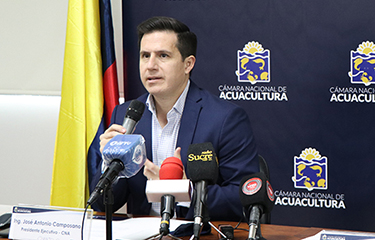As Ecuador’s multibillion-dollar shrimp sector continues to grow, animal health and welfare will be the next area of focus for the aquaculture industry, according to José Antonio Camposano, executive president of Ecuador’s National Chamber of Aquaculture (CNA).
Over the years, Ecuador’s shrimp industry has learned to embrace international requirements and implement changes to be aligned with them, according to Camposano.
“We can't turn our backs on them,” he told SeafoodSource. “On the contrary, we need to sit down with them and discuss, so that the technology available allows us to establish the corresponding indicators. Something that we have learned as an industry is that all these issues must be addressed directly. This approach has prevented us from having problems with the community or with society because at the end of the day, being a small country, if we start fighting among ourselves, someone ends up leaving. There is no room for fighting.”
The latest effort to align with the requirements continues a streak of cooperation between Ecuador’s shrimp sector and environmental groups. The CNA has been working for years to establish a reputation for the sustainability and trustworthiness of its farmed shrimp industry – its first formal exercise, initiated six years ago, was the foundation of the Sustainable Shrimp Partnership. The platform is global, but thus far the sustainability program's only certified farms are in Ecuador.
That sustainability push has been evident in the sector’s insistence in the preservation of mangrove forests. When the industry was established over 50 years ago, many mangroves – which sequester carbon from the atmosphere, prevent coastal erosion, and provide habitat to a number of native species – were cleared to make way for shrimp farms.
In 1999, Ecuador’s shrimp industry called on the government to enact a law prohibiting the development of new shrimp farms in or even near mangroves. Camposano recognized the historical environmental criticism over the conversion of mangrove areas to shrimp farms, but said that now, as the world’s leading shrimp producer, the sector has the responsibility to lead by example and ensure compliance with local laws and local and international standards.
“We need to think about what we can do to lead or push the rest of the industry to improve. We must lead by example, we have that role,” he said. “We have to take advantage of this moment. Who knows if tomorrow a bigger supplier emerges?"
In 2021, the Coastal Habitat Stewardship Fund was established to incentivize local communities in Ecuador to conserve mangrove forests. It was supported by the partnership of the Aquaculture Stewardship Council (ASC), Conservation International, and Ecuador’s Ministry of Environment, Water, and Ecological Transition.
In 2022, the Ecuadorian branch of the World Wildlife Fund (WWF) and the CNA signed an agreement that looks to halt the conversion of natural habitat to accommodate shrimp farming in the country.
The two entities said the agreement marked the first-ever national commitment for conversion-free aquaculture. Under this arrangement, Worcester, Massachusetts, U.S.A.-based Clark Labs will generate geospatial data for WWF-Ecuador and CNA to analyze and classify land cover in coastal regions where shrimp farming is most common. CNA will then use this data to set a baseline founded on scientific evidence, repeating the analysis yearly with the goal of reducing and ultimately ending all land conversion for shrimp farming nationwide.
According to Camposano, CNA is now in discussions with WWF to enter a second phase of the program, whereby studies will be updated and published every two years to document conservation efforts.
The CNA’s focus has, for years, been on ensuring the protection of its native mangrove forests and ecosystems, but now, the environmental argument has evolved ...
Photo courtesy of Ecuador’s National Chamber of Aquaculture








